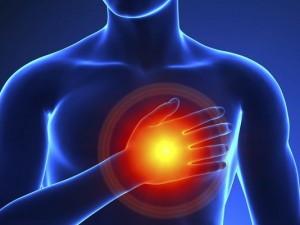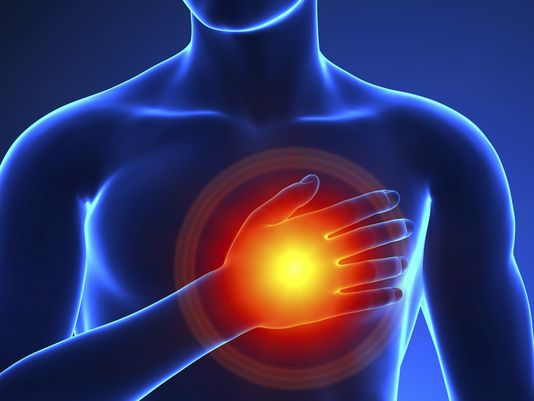 Are you having a silent heart attack?Most people know that shooting pains down your right arm coupled with chest pain are signs of a heart attack. But not every heart failure looks like the chest clutching drama you see in the movies. You could be having minor heart failures and not even realize it. Every one of these failures could be contributing to the deterioration of your heart health.
Are you having a silent heart attack?Most people know that shooting pains down your right arm coupled with chest pain are signs of a heart attack. But not every heart failure looks like the chest clutching drama you see in the movies. You could be having minor heart failures and not even realize it. Every one of these failures could be contributing to the deterioration of your heart health.
And you want to catch these signs before it is too late.
Signs that you are having heart failure
Take a look at the list of symptoms below. If you are frequently experiencing two or more of these symptoms then you should get yourself checked by a health care professional, because your heart could be at risk.
Shortness of Breath
If you are often short of breath, regardless of if you are resting or exercising, it could be a sign of heart failure. Sometimes you may even wake up because you are short of breath, or find that it’s difficult to breath when you are lying flat, but easier when you are well propped up.
The reason heart failure can make you feel short of breath is because your heart is not keeping up with the blood returning from your lungs through the pulmonary veins. What happens then is that blood leaks into your lungs, making you feel breathless.
Chronic Coughing or Wheezing
If you find yourself coughing and wheezing, even though you’re not sick, it could be your heart. As described above, heart failure can cause blood to leak into your lungs. This blood in the lungs can trigger coughing and wheezing.
If you are short of breath and have a persistent cough, even though you’re not ill, you should visit a medical professional and tell them you are worried about your heart. If you cough up pink or bloodied mucus from your lungs, you should seek medical attention as soon as possible.
Water Retention in body tissues (Edema)
Swollen feet, ankles, legs, belly or excessive, unexplained weight gain are all signs of heart failure.
Because your heart is not coping with the load of blood returning to it from your body it begins to back up in your veins. This causes the blood to build up in your body tissue, making your kidneys less effective. When this happens your kidneys can’t properly dispose of water and salts, and so the fluid builds up inside your tissues.
This extra fluid is what causes swelling and weight gain.
Fatigue and lightheadedness
Feeling tired all the time is another sign of quiet heart failure. If you are tired and you feel lightheaded or dizzy it could be because your heart is not able to pump enough blood around your body. Your body tissues need fresh oxygen delivered to them to keep you functioning normally.
Suzanne Steinbaum, Director of Women’s Heart Health at the Heart and Vascular Institute at Lenox Hill Hospital in New York City, says that many people, especially women, brush this symptom off too lightly. Instead you should be having a medical checkup if you are constantly tired and can’t seem to get better.
If your heart is struggling to pump enough blood then your body will protect its most vital organs (like your brain) by sending enough blood to those organs first. The muscles in your limbs will only receive blood after your vital organs are safe – which is why your limbs may feel heavy and everyday tasks like walking up the stairs or pushing a shopping cart may seem exhausting.
Nausea or lack of appetite
Another symptom you may experience if your heart is struggling to get enough blood around your body is stomach problems. Your digestive system, like your limbs, is only going to receive fresh blood from your heart after the vital organs.
The result is that you may experience all kinds of digestive problems, nausea and lack of appetite.
Confusion or slow thinking
This is a symptom your family and friends may notice before you do. You may start to become very forgetful or find that you are easily confused. This can be quite scary and disorientating when you start to notice it.
Because your heart is not pumping blood properly and your blood is not being fully replenished with all of the chemicals and nutrients that should be in it – your blood is unable to feed your brain with the delicate balance of chemicals it needs to function properly.
High Heart Rate
If you feel like you are having heart palpitations, like your heart is racing or skipping beats, then you should definitely visit the doctor. These symptoms usually occur because your heart is not able to pump the right amount of blood with each pump, so it is having to work harder to keep you healthy.
You feel pain when you’re active
If you find your muscles are sizing up in pain whenever you’re even slightly active, it could be your heart failing. If you have peripheral arterial disease (a buildup of fatty plaque in your arteries inside your legs) then walking could become painful for you.
Headaches are a sign of heart failure
If you are having headaches often and you are also experiencing any of the other symptoms above it could be because of heart failure. Both heart failure and migraines are symptoms of automatic nervous system imbalances.
How heart attacks differ for men and women
Did you know that men and women experience heart failure differently? Although many of the signs and symptoms are the same, we do have some important differences between us.
Women often experience more shortness of breath and difficulty with physical activity when their hearts fail. Women also experience water retention (swollen ankles and wrists) more frequently as a side effect of heart failure, than men do.
Most men display congestive heart failure much sooner than women, whereas women tend to develop heart problems at an older age.
Women who experience heart failure often do so as a result of high blood pressure, coronary disease, diabetes mellitus or valvular disease. Men are more likely to develop heart disease without long-running prior illnesses.
Women who suffer from diastolic heart failure (heart failure caused by stiff, inflexible heart muscles) tend to maintain a more regular ejection faction than men do. That means that they are pumping more blood out of the left ventricle of the heart than men with diastolic heart failure.
Women are more likely to develop Systolic heart failure (heart failure caused by weakened heart muscles) than men are.
More women than men suffer from depression – which is often associated with heart failure.
There is a type of heart failure which is exclusive to women, this is heart failure caused by peripartum cardiomyopathy. It occurs only during the last month of pregnancy and during the first five months after the baby is born.
In spite of these problems women with heart disease tend to outlive men with heart disease
How can I prevent Heart Disease?
Quit Smoking. Smoking is very bad for the health of your heart. If you want to prevent heart disease you have to quit smoking right away. Seek professional help if you have to.
Regular exercise is essential to raise your good HDL levels (good Cholesterol) and thereby make LDL (bad Cholesterol) levels less of a problem. Exercise also keeps your heart healthy because it works just like any other muscle in the body – it needs gentle exercise to keep it strong.
Have a Stress Release Mechanism. Stress is a killer because it is such a major factor in creating a heart disease environment inside your body. You need to find ways of releasing stress naturally. These can be physical outlets such as fishing, golf, tennis and other sports, even yoga and surfing. You can also have spiritual outlets for stress like prayer and meditation. If you can’t find a way to release stress on your own you might want to visit a stress councilor for a consultation on stress management.
No more Sugar, refined carbs and bad fat. You should cut out all sugars and all refined carbohydrates that revert to sugar (these include white bread, cakes and white pasta) because sugar causes inflammation in your body.This inflammation can cause all kinds of problems, including heart failure and cancer.
Bad fat is another major culprit. Bad fats are saturated fats, they are the fats you find in foods which have been deep friedor highly processed. Saturated fats clogs up your arteries and restrict the flow of blood around your body. The combination of saturated fat and sugar together does the most harm to your heart and arteries.
Eat Well. Increase the amount of fresh fruit, nuts, vegetables and whole grains that you eat. These things should make up the bulk of your diet every day. You can moderate how much fish and chicken you eat as a little of these is okay for your body. Cut back on red meat. Red meat is not good for the health of your heart and you should eat as little of it as possible, or cut it out altogether.
Replace refined carbohydrates and “bad” fats with healthier options. These would include whole wheat bread and pasta, brown rice and large flake rolled oats. Good fats to eat include coconut oil, avocados, pumpkin seeds, nuts and dark chocolate. Read more about good fats in our article, 5 fats that help you lose weight.
Remember, heart disease and heart failure can have all kinds of “quiet” symptoms. If you want to lead a full, healthy life you have to pay attention to all of the possible warning signs. Make sure that you are at a low risk because you eat well and live a healthy, active lifestyle.
Now that you know the 9 signs of heart failure, go to the next page to learn about how you can prevent a heart failure by eating this 1 nutrient (the nutrient helps to reduce cholesterol)
About the Author:
Emma Deangela is the best selling author of The Alkaline Diet Program and 80/20 Fat Loss. She has helped over tens of thousands of men and women to lose weight and transform their health with sound nutrition advice. Watch her new video on how your blood affect your health and weight.
Which wonderful friends in your life would appreciate this information about these tips on reducing anti-nutrients in their foods?
Please help them by sharing this eye-opening article with each of them using any of the social media and email buttons below.


Leave a Reply